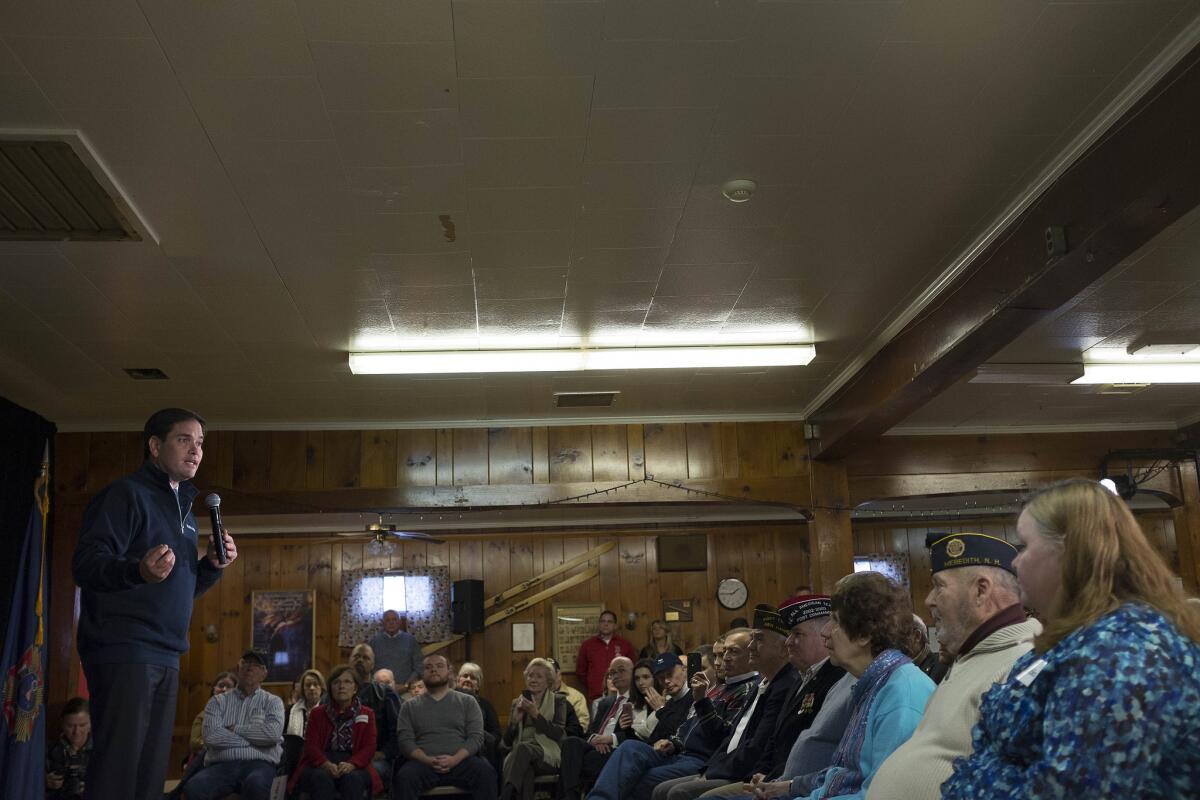Column: Why horse race campaign polls are mostly worthless this far ahead of the voting

Republican Presidential candidate Marco Rubio speaks during a town hall at the VFW in Laconia, N.H. on Nov. 30. Rubio has slowly been rising in the polls in recent weeks.
The first votes for the Republican presidential nomination won’t be cast until February, but the polls have already provided enough drama for a full campaign cycle. Donald Trump surged to the top, faltered for a moment, then regained his lead. Ben Carson challenged him, but appears to be fading. Now Ted Cruz is coming on strong — or, to quote a newspaper story that unabashedly lapsed into horse race language, “making his move.”
Horse race polls have become the junk food of political journalism. We consume too many of them, too often. I’m as guilty as anyone else — and maybe more; I don’t just read about the polls, I write about them. (That makes me a pusher.)
But here’s an inconvenient truth: None of those polls can tell us, at this point, who’s likely to win the GOP nomination.
It’s easy to prove that early polls are lousy at predicting the ultimate outcome in a crowded primary race; just look at the record.
It’s easy to prove that early polls are lousy at predicting the ultimate outcome in a crowded race; just look at the record. At this point four years ago, Newt Gingrich had a huge lead over Mitt Romney; in the end, he finished third. Eight years ago, Mike Huckabee had a Trump-sized lead over John McCain; a year later, Huckabee was looking for work as a television host.
“It’s hard enough to predict how people will vote in [a general election] in November, when there are only two major candidates,” noted Michael Dimock, president of the Pew Research Center, which produces some of the country’s best polling. “It’s much harder in the primaries. You have more levels of complexity — more candidates, more uncertainty about who’s really going to vote…. These polls are like a finger in the wind.”
It’s not only the number of candidates — 13 at this point — that makes the outcome unpredictable. Most voters haven’t made up their minds yet, a phenomenon few of those horse race polls take the time to point out.
How do I know that? From surveys, of course. The Monmouth University poll asked Republicans in New Hampshire last month whether they had “completely decided” which candidate to support; only 20% said yes. In the 2012 New Hampshire primary, 46% of GOP voters said in exit polls that they had waited until the final week to make up their minds.
Voters are quite right to take their time. Campaigns are a learning process for candidates and voters alike; most voters are still pondering what kind of president should succeed Barack Obama. It’s a sequential process, too; the outcome of one contest influences voters in the next. There’s evidence, for example, that some New Hampshire voters wait to see how the Iowa caucuses turn out before they decide.
If you want a rule of thumb for when to start trusting polls, here it is: The predictive power of horse race polls is low until “roughly a month before the Iowa caucuses,” according to John Sides, a political scientist at George Washington University. Since the caucuses are Feb. 1, that means you can safely ignore the candidates’ rankings until after Christmas. Even then, the only polls that really matter will be the ones in Iowa; national polls are much less relevant.
That also means there’s no need to worry too much about a Trump presidency — yet. The real estate mogul’s apparent lead may turn out to be a mirage once the actual voting begins.
“Trump support skews towards non-voters and independents who in many states cannot vote in primaries or caucuses — and, in any case, show up less often,” political analyst Charlie Cook wrote in National Journal this week. Cook suggested that many conservatives “are working through various stages of alienation and anger that is manifesting itself for now in support for Trump and Carson,” a process he likened to the five stages of grief described by psychiatrist Elisabeth Kübler-Ross; once they’re done, he suggested, many may opt for a less angry candidate.
Polls do have some value, of course. Although they can’t tell us who’s going to win, they can tell us who’s worth watching, or who’s attracted enough support to have a shot at winning. In Iowa, that list includes Trump, Carson, Ted Cruz and Marco Rubio; in New Hampshire, add John Kasich and Jeb Bush.
Good polls can also tell us what’s driving the voters — why, for example, so many Republicans are opting for unconventional “outsider” candidates this year. The short answer, as Pew’s research has shown, is that many conservatives aren’t just worried about the direction the country is going, they’re angry — including at their own party’s traditional leaders. Another intriguing finding, this one from a poll by the Public Religion Research Institute: Republicans are more pessimistic than Democrats. In that survey, more than half of Republicans said they think America’s best days are behind, not ahead; among Democrats, more than half said they believed the future would be better.
Those insights into public opinion will be relevant long after this week’s primary polls. As for the horse race, feel free to tune out. It may seem as if this campaign has been underway a long time — but in terms of voters making real choices, it’s still early.
Twitter: @doylemcmanus
Follow the Opinion section on Twitter @latimesopinion and Facebook
More to Read
A cure for the common opinion
Get thought-provoking perspectives with our weekly newsletter.
You may occasionally receive promotional content from the Los Angeles Times.











